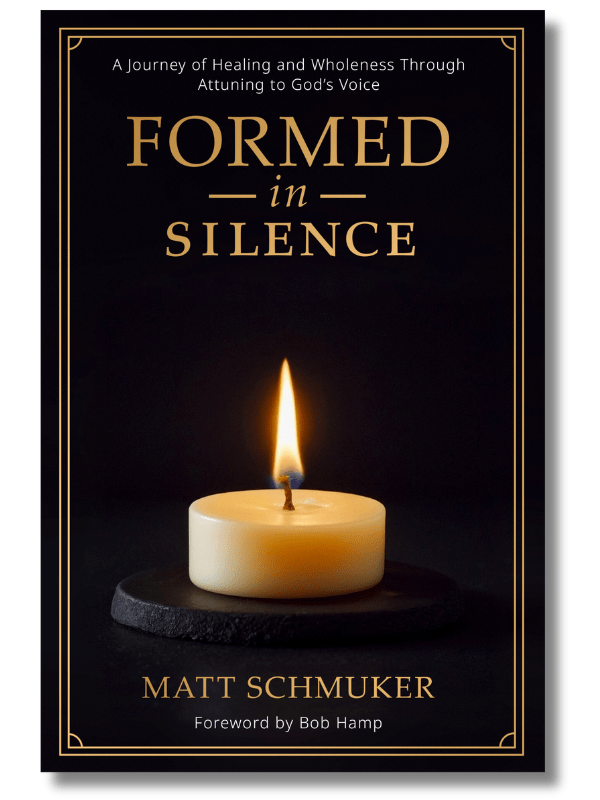
Formed In Silence
by Matt Schmuker
Genre: Nonfiction / Christian Living
ISBN: 9798992037203
Print Length: 176 pages
Reviewed by Lauren Hayataka
From inner chaos to stillness, a believer’s life is reshaped by the quiet strength of surrender.
Matt Schmuker’s Formed in Silence is a book shaped by tension—between silence and striving, presence and performance, fear and trust. Written with care and clarity, it traces one man’s movement out of spiritual rigidity and into a posture of listening, where the voice of God is not thunderous or formulaic but overwhelmingly quiet, patient, and deeply personal.
Part memoir, part meditation, Schmuker’s writing is rooted in experience rather than abstraction. He recounts the slow unraveling of his inner life, beginning in his teenage years and continuing into adulthood: long hours of prayer that only amplified his anxiety, intrusive thoughts mistaken for spiritual failure, and the exhaustion of doing everything “right” only to feel further away from God. What emerges from these stories isn’t bitterness but a persistent desire to know God differently—and to be known in return.
The phrase “obsessive-compulsive Christianity,” which Schmuker uses to describe his past approach to faith, is not a glib metaphor. It’s a painful and accurate depiction of how fear, when left unexamined, can quietly take the lead in one’s spiritual life—turning sincere devotion into a cycle of pressure, vigilance, and self-monitoring. Schmuker’s honesty in tracing this pattern—especially his recognition of how reflexively quoting Scripture became less about truth and more about warding off imagined danger—is one of the book’s greatest strengths. He doesn’t frame fear as a failure of faith but as a sign that something deeper needs tending.
But Formed in Silence is not just about what fell apart—it’s about what slowly formed in its place. A shift begins when Schmuker stops treating faith as a set of tasks and starts asking fundamental questions (regardless of how silly they may seem at first): “How do you see me?” “What lies am I believing?” “Is there anything you want to say to me about this moment?” These small prayers become an entry point into a new rhythm—one rooted not in instant answers but in attentiveness. He describes it as a trust fall with God, and the metaphor fits. There are no grand resolutions here, only gradual change.
The book’s theological posture is both thoughtful and open-handed. While clearly grounded in Scripture and the Christian tradition, Schmuker also reflects on the limits of certainty, the dangers of fear-driven doctrine, and the importance of remaining teachable. He writes with respect for the Bible but warns against treating it as a closed system: “Scripture became a framework for thinking,” he writes, a line that captures the core of his approach. He invites readers to hold truth and tension together—to listen without rushing to explain.
Schmuker also explores how spiritual formation is not just a matter of belief but of becoming. His reflections on identity—particularly the distinction between the false self formed through pain and the true self created by God—are some of the most affecting in the book. He weaves together stories of childhood wounds, pastoral exhaustion, mental health struggles, and parenting with tenderness and insight. There’s a deep sense that nothing in his life is offered as a blueprint—only as a testimony that restoration, while not easy, is possible.
Stylistically, the writing is warm and accessible, with a pace that reflects the contemplative rhythm it encourages. Schmuker leans into metaphor without relying on it, grounding abstract ideas in lived detail—like an unexpected image of a cow chewing grass or a license plate that nudges a major life decision. These moments resist being turned into parables; instead, they model what it looks like to pay attention.
Defining all of his ideas is “epiphinal living”—a way of seeing that isn’t reserved for rare mountaintop moments but can be cultivated through regular, sustained openness to God’s voice. It’s not a slogan, but a way of moving through the world with greater sensitivity, formed slowly through silence, repetition, and the ongoing work of letting go.
Formed in Silence is not prescriptive. It doesn’t offer steps or solutions. But for those shaped by performance-based faith or worn out by spiritual striving, this book will feel like someone turning down the volume in a loud room. What Matt Schmuker offers isn’t a system—it’s an invitation—not to do more, but to listen more closely.
Thank you for reading Lauren Hayataka’s book review of Formed In Silence by Matt Schmuker! If you liked what you read, please spend some more time with us at the links below.


0 comments on “Book Review: Formed In Silence”